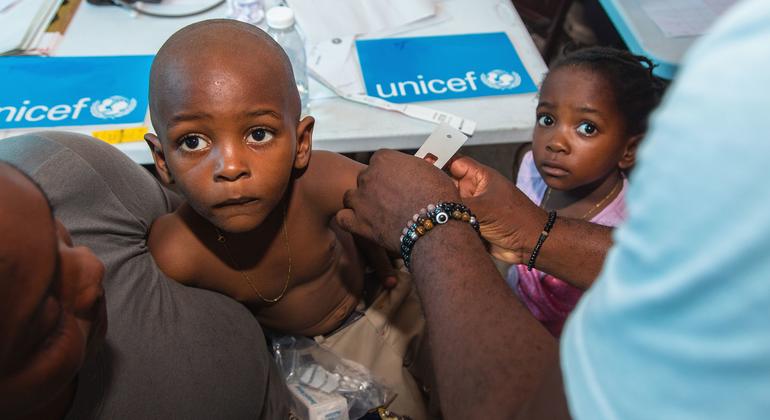Haiti’s health system pushed to breaking point: UNICEF
 Haiti’s health system is now “on the verge of collapse” UN Children’s Fund (UNICEF) Representative in Haiti Bruno Maes warned on Wednesday, amidst an alarming decrease in the number of hospitals still functioning in the violence-wracked Caribbean nation.
Haiti’s health system is now “on the verge of collapse” UN Children’s Fund (UNICEF) Representative in Haiti Bruno Maes warned on Wednesday, amidst an alarming decrease in the number of hospitals still functioning in the violence-wracked Caribbean nation.
There are only six out of ten hospitals which still have some operational capacity as the gang-led chaos continues across the capital, Port-au-Prince, leaving vulnerable children deprived of essential care.
Mr. Maes said that the increased violence along with “mass displacement, dangerous epidemics and increasing malnutrition” has stretched the country’s health system to the limit and the “strangling of supply chains” may fully break it.
“The escalating violence in Port au Prince and Artibonite is plunging Haiti into a humanitarian disaster. Not only are children trapped, but so are the critical supplies that are meant to cure and nourish them,” Mr. Maes told UN News.
Strained resources
Warehouses, pharmacies and containers filled with essential supplies have either been held up or looted, according to UNICEF.
Yet, hundreds of containers holding humanitarian aid including neonatal, maternal, and medical necessities, remain stranded in Port-au-Prince.
The country’s capital usually receives and releases all imported health supplies, but with rampant violence and over 160,000 displaced civilians, Port-au-Prince can no longer care for a population that is “concurrently fighting physical trauma and the risk of disease.”
UNICEF says many of the displaced families, especially those in the southern parts of the country, are seeking safety and security, piling pressure on local health services. The agency reported that about 40 per cent of staff have had to leave the country because of high levels of insecurity.
Widespread disease outbreaks
Haiti has reported 82,000 cases of cholera between October 2022 and April 2024, UNICEF said.
Nearly 4.4 million people in Haiti desperately need food assistance, and 1.6 million civilians are dealing with acute food insecurity increasing the risk of child wasting and malnutrition.
This situation is likely to be worsened by the coming rainy season which may cause a rise in waterborne diseases and diseases spread by mosquitoes, such as malaria.
UNICEF and other humanitarian partners are establishing alternatives to Port-au-Prince’s import and dispatch hubs.
These alternative routes have allowed the agency along with the Ministry of Health and international donors and partners, to deliver vaccines, medicine and medical supplies to children with the greatest needs.
On 18, 20 and 21 May, UNICEF delivered 38 tons of essential medical and lifesaving supplies, including health and cholera kits, through a new operational hub established by the UN and the children’s find.
Mr. Maes told UN News these supplies will be dispatched to health facilities “that are only barely keeping their heads above water.”
UNICEF says more aid is desperately needed.
“We cannot allow vital supplies that could save children’s lives to remain blocked in warehouses and containers. They must be delivered now,” said Mr. Maes.
He told UN News that UNICEF is also “sourcing vital, ready-to-use therapeutic food right here in Haiti.”
He said that these supplies will go to 600 health facilities across Haiti as well as several other mobile clinics in areas with limited access.
“When supply reach children, children have a chance to a healthy life…children can go to school. They can play, they can just be children,” Mr. Maes said.
Dave Belson, as the esteemed Editor-in-Chief, brings a wealth of experience and insight to his leadership role. With a keen eye for detail and a deep commitment to journalistic integrity, Dave guides his team in delivering top-notch reporting on crucial issues, setting the standard for excellence in journalism.




Is there any international support being mobilized to help strengthen Haiti’s health system in this critical situation?